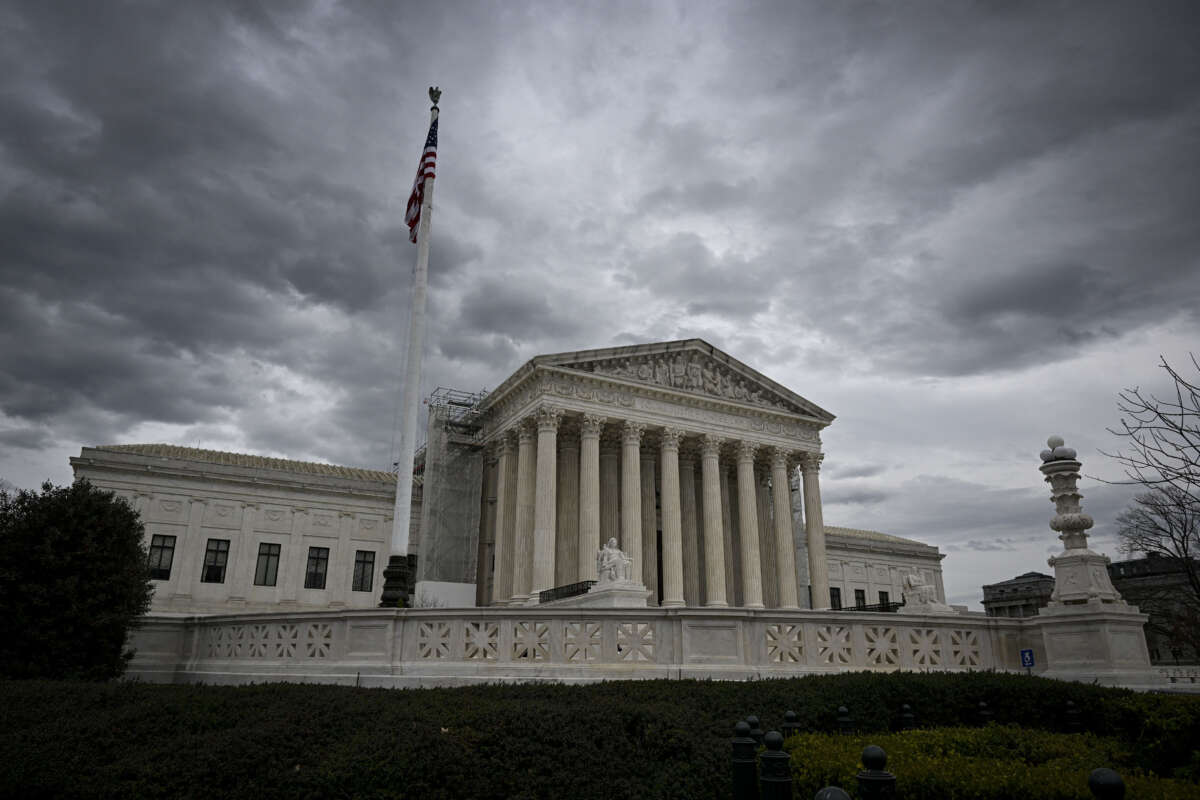The Supreme Court is set to hear oral arguments on Tuesday regarding the legality of the approval process for the abortion medication mifepristone, in a case that could result in further abortion regulations just two years after the Court upended federal protections for the procedure.
The case, Food and Drug Administration (FDA) v. Alliance for Hippocratic Medicine, centers around dubious arguments from a right-wing anti-abortion group regarding the FDA’s approval process for mifepristone more than two decades ago, as well as the agency’s decision to loosen regulations for the medication in 2016 and 2021.
Far right petitioners “shopped” for a judge who would listen to their qualms about the drug’s initial approval. They found the person they were looking for in U.S. District Judge Matthew Kacsmaryk, a Trump appointee who ruled last year that access to mifepristone should be blocked completely. Kacsmaryk readily accepted the petitioners’ arguments despite them being riddled with falsehoods and dubious scientific claims.
The Department of Justice (DOJ) appealed that ruling to the Fifth Circuit Court of Appeals, which overturned parts of Kacsmaryk’s ruling but allowed some aspects to remain in place, keeping the drug’s approval from 2000 legal but reverting regulatory rules on the drug back to pre-2016 standards. That meant that the use of mifepristone would be limited to seven weeks of pregnancy instead of 10 weeks, and that telemedicine prescription and use of the postal service for delivering the drug would be barred completely.
The feds appealed the case further to the U.S. Supreme Court, which placed a hold on the Fifth Circuit’s ruling last year, pending the outcome of the case. The hold means access to mifepristone remains unchanged for the time being, keeping in place the standards that existed before Kacsmaryk’s ruling.
As millions of Americans live in parts of the country that have curtailed abortion rights or even banned the procedure entirely, abortion medication has become an invaluable option for those seeking to terminate their pregnancies. Nearly two-thirds of all abortions in the U.S. last year involved the use of mifepristone.
Arguments from anti-abortion activists in the case against the drug have centered on flawed science, as the American Civil Liberties Union (ACLU) noted in an amicus brief to the Supreme Court earlier this year.
“The lower courts uncritically relied at every stage on patently unreliable witnesses and studies,” the ACLU said in its brief.
The civil rights organization pointed out that Kacsmaryk cited a study in his ruling that purported that the drug resulted in negative mental health impacts for those who used it. That “study,” however, was based on 98 anonymous blog posts to an anti-abortion website — hardly a critically sound or scientific examination.
The Fifth Circuit, too, relied on unsound “experts” to form its opinion. The court cited Ingrid Skop, a senior fellow at the Charlotte-based Lozier Institute, an anti-abortion “research” center, more than a dozen times in its ruling. But as the ACLU noted in its brief, “Dr. Skop admitted in 2020 that she is ‘not a really good researcher,’ and that she routinely ‘lift[s]’ language from other authors without attribution, claiming she ‘didn’t realize that, you know, using wording from a paper that you agreed with qualified as plagiarism.'”
The Fifth Circuit Court also relied on allegations from Donna Harrison, also from the Lozier Institute, whose testimony in other court cases has been proven inaccurate and “at odds with solid medical evidence,” the ACLU said.
Despite the hold placed on the lower court rulings, there is worry that the Supreme Court, which has undergone a hard right shift in the past decade, could implement restrictions in this case that wouldn’t just affect abortion medication but also the approval process of other drugs the FDA has greenlit in the past.
Nourbese Flint, President of All* Above All, a pro-abortion access organization, told Truthout in January that the case was never about ensuring safety, but about denying people health care.
“Let’s be clear what this case is about — it’s about banning access to the most common method of abortion that people increasingly rely on for care,” Flint said.
Physicians for Reproductive Health, a group of medical providers who advocate for expanded access to reproductive health care, also submitted an amicus brief to the case, decrying the possible outcome if any of the lower courts’ standards are allowed to stand.
“The rulings of the lower courts would jeopardize patient health rather than protect it. … Restricting access to mifepristone impedes patient autonomy and places providers in untenable positions,” their brief read.
Matching Opportunity Extended: Please support Truthout today!
Our end-of-year fundraiser is over, but our donation matching opportunity has been extended! All donations to Truthout will be matched dollar for dollar for a limited time.
Your one-time gift today will be matched immediately. Your monthly donation will be matched for the whole first year, doubling your impact.
This matching gift comes at a critical time. As Trump attempts to silence dissenting voices and oppositional nonprofits, reader support is our best defense against the right-wing agenda.
Help Truthout confront Trump’s fascism in 2026, and have your donation matched now!
